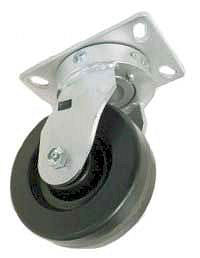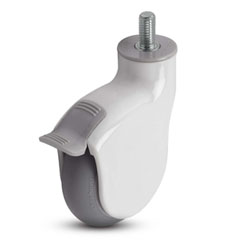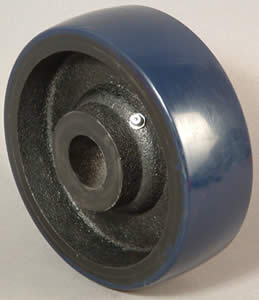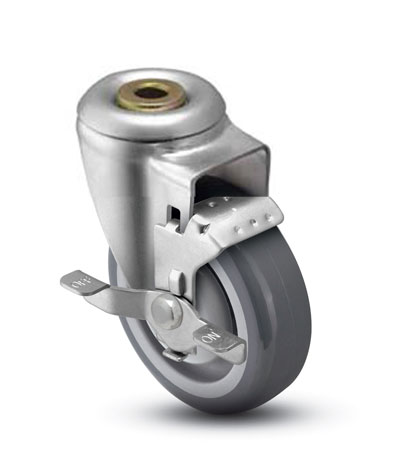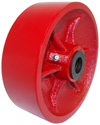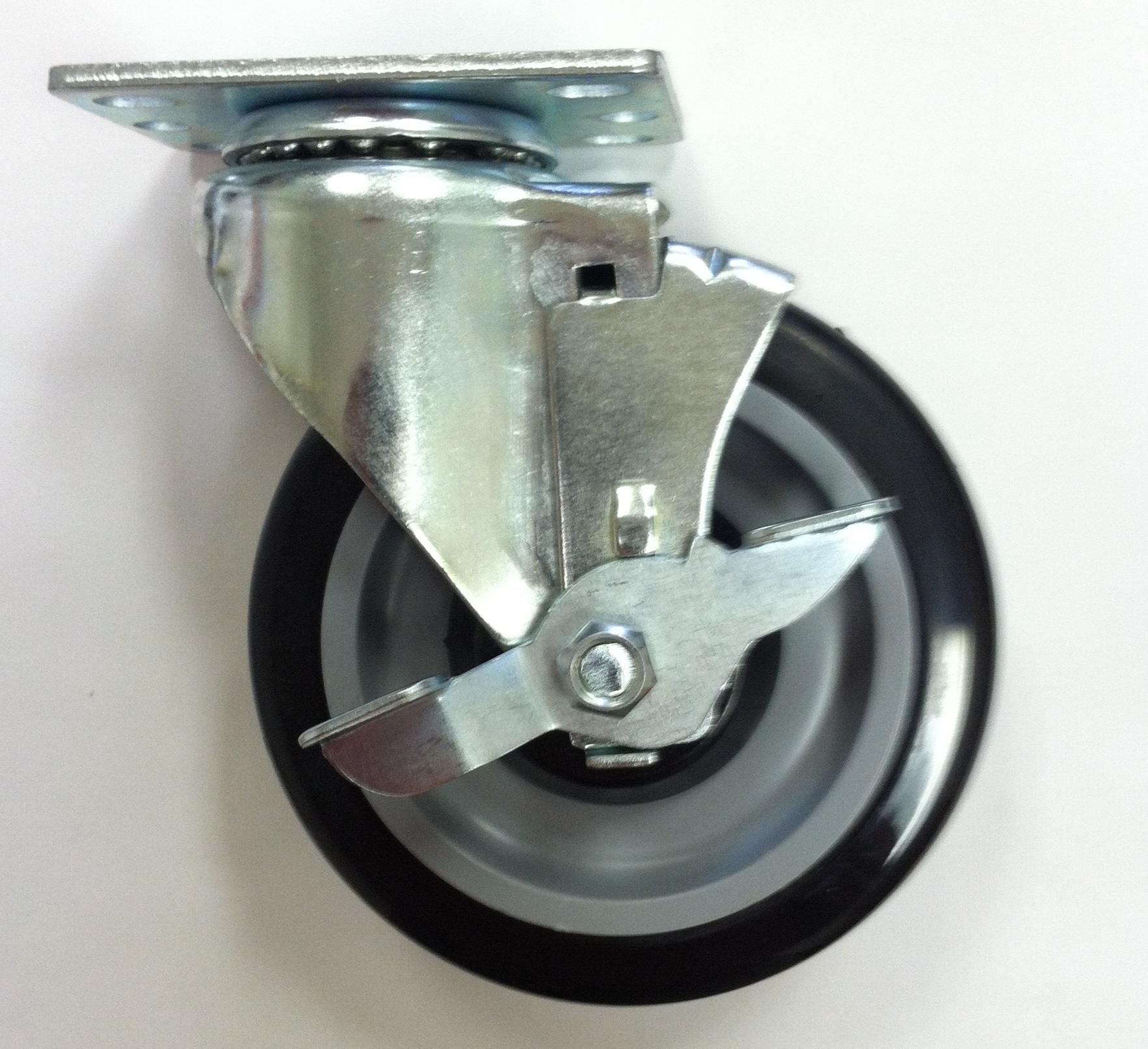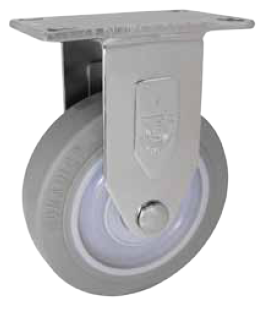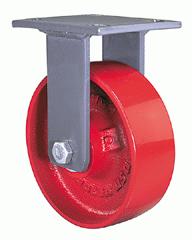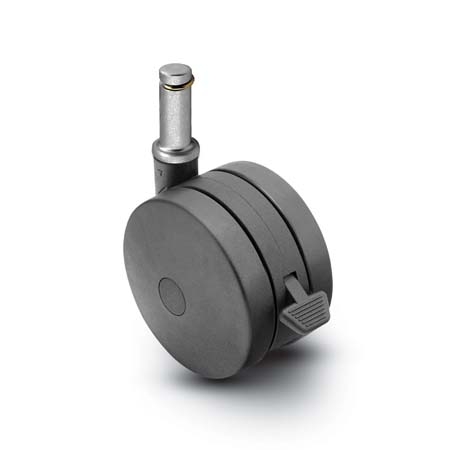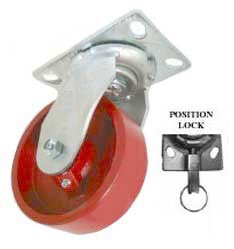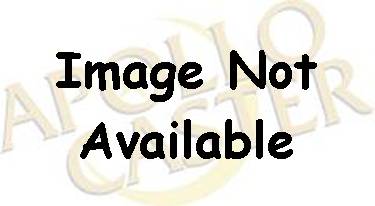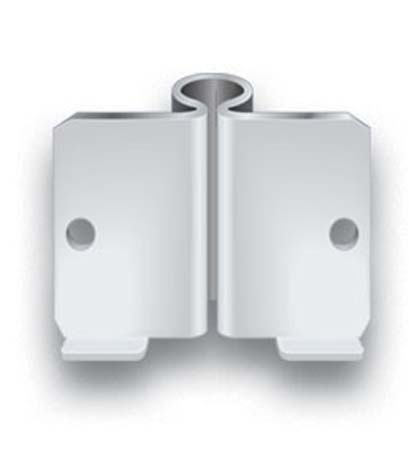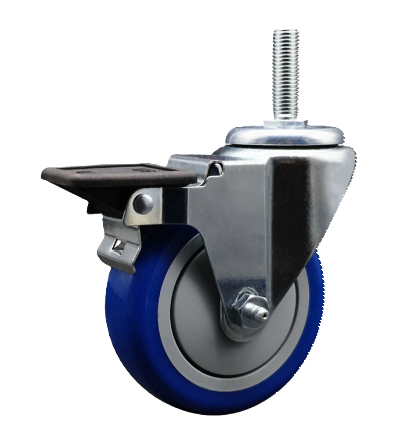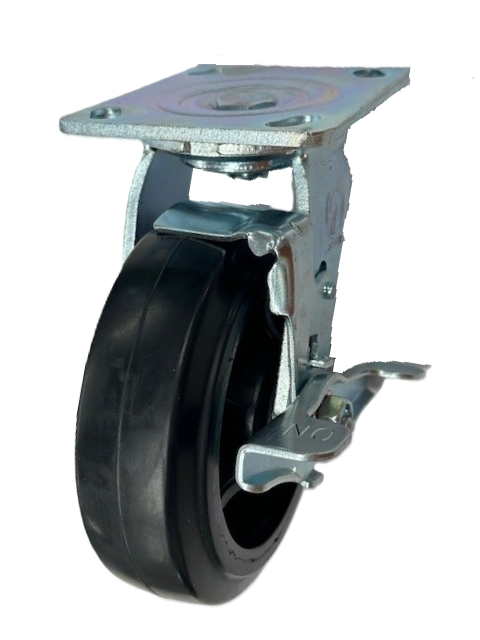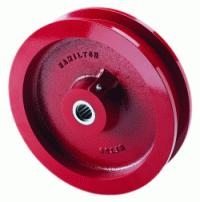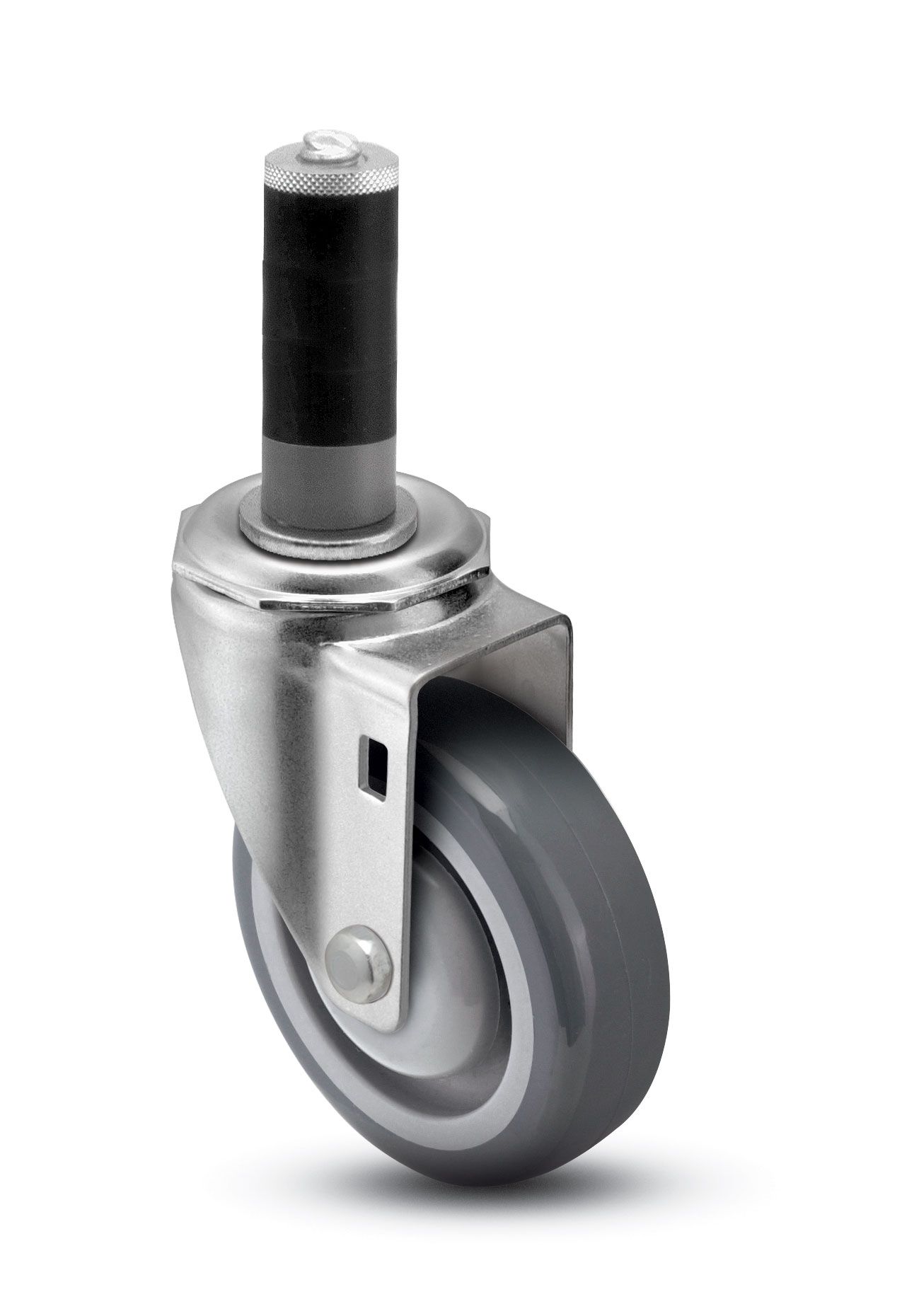Caster; Swivel; 6 x 2; Polyolefin; Top Plate; 4x4-1/2; holes: 2-5/8x3-5/8 (slotted to 3x3); 3/8 bolt; Roller Brng; 750#; Kingpinless (Item #68603)
$56.46
Caster; Swivel; 6 x 2; Polyolefin; Top Plate; 4x4-1/2; holes: 2-5/8x3-5/8 (slotted to 3x3); 3/8 bolt; Roller Brng; 750#; Kingpinless... more info
Caster; Swivel; 3" x 1"; Gray Soft Rubber Wheel; Threaded Stem (5/16"-18TPI x 1"); White; Precision Ball Brng; 110#; Pedal Brake; Thread guards (Item #65448)
$27.70
Caster; Swivel; 3" x 1"; Gray Soft Rubber Wheel; Threaded Stem (5/16"-18TPI x 1"); White; Precision Ball Brng; 110#; Pedal Brake; Thread guards... more info
Wheel; 5" x 2"; PolyU (Crowned) on Cast (Bl/Bk); Plain bore; 1250#; 1-3/16" Bore; 2-3/16" Hub Length (Item #89443)
$27.92
Wheel; 5" x 2"; PolyU (Crowned) on Cast (Bl/Bk); Plain bore; 1250#; 1-3/16" Bore; 2-3/16" Hub Length... more info
Caster; Swivel; 5" x 1-1/4"; PolyU on PolyO (Gray); Hollow Kingpin (1/2" bolt hole); Zinc; Plain bore; 300#; Tread brake (Item #65079)
$14.89
Caster; Swivel; 5" x 1-1/4"; PolyU on PolyO (Gray); Hollow Kingpin (1/2" bolt hole); Zinc; Plain bore; 300#; Tread brake... more info
Wheel; 6" x 3"; Steel (Ductile); Roller Brng; 1" Bore; 3-1/4" Hub Length; 6000# (Item #87759)
$71.09
Wheel; 6" x 3"; Steel (Ductile); Roller Brng; 1" Bore; 3-1/4" Hub Length; 6000#... more info
Caster; Swiv; 3 x 1-1/4; Rubber; Hard; Top Plate; 2-1/2x3-5/8; holes: 1-3/4x2-7/8 (slotted to 3); 5/16 bolt; Zinc; Ball Brng; Wgt Cap: 250; Top Lock; TG (Item #69954)
$18.54
Caster; Swiv; 3 x 1-1/4; Rubber; Hard; Top Plate; 2-1/2x3-5/8; holes: 1-3/4x2-7/8 (slotted to 3); 5/16 bolt; Zinc; Ball Brng; Wgt Cap: 250; Top Lock; TG... more info
Caster; Rigid; 6" x 1-1/4"; PolyU on PolyO (Gr/Bg); Top Plate (2-1/2"x3-3/4"; holes: 1-3/4"x2-7/8" slotted to 3"; 5/16" bolt); Zinc; Precision Ball Brng; 300# (Item #66004)
$12.12
Caster; Rigid; 6" x 1-1/4"; PolyU on PolyO (Gr/Bg); Top Plate (2-1/2"x3-3/4"; holes: 1-3/4"x2-7/8" slotted to 3"; 5/16" bolt); Zinc; Precision Ball Brng; 300#... more info
Caster; Rigid; 8" x 3"; Steel (Ductile); Top Plate (4-1/2"x6-1/4"; holes: 2-7/16"x4-15/16" slotted to 3-3/8"x5-1/4"; 1/2" bolt); Zinc; Roller Brng; 6000# (Item #65495)
$150.04
Caster; Rigid; 8" x 3"; Steel (Ductile); Top Plate (4-1/2"x6-1/4"; holes: 2-7/16"x4-15/16" slotted to 3-3/8"x5-1/4"; 1/2" bolt); Zinc; Roller Brng; 6000#... more info
Caster; Rigid; 8" x 2-1/2"; V-Groove (7/8) Cast Iron; Plate (4-1/2"x6-1/4"; holes: 2-7/16x4-15/16 slots to 3-3/8x5-1/4; 1/2 bolt); Roller Brng; 2200#; Face Brk (Item #64943)
$145.39
Caster; Rigid; 8" x 2-1/2"; V-Groove (7/8) Cast Iron; Plate (4-1/2"x6-1/4"; holes: 2-7/16x4-15/16 slots to 3-3/8x5-1/4; 1/2 bolt); Roller Brng; 2200#; Face Brk... more info
Caster; Twin; Swivel; 3" (75mm); Nylon; Grip Ring; 7/16"x7/8"; Black; Rivet; 165#; Pedal Lock; Wheel (Item #68996)
$7.68
Caster; Twin; Swivel; 3" (75mm); Nylon; Grip Ring; 7/16"x7/8"; Black; Rivet; 165#; Pedal Lock; Wheel... more info
Caster; Swivel; 6 x 2-1/2; Steel (Ductile); Plate (4-1/2x6-1/4; holes: 2-7/16x4-15/16 slotted to 3-3/8x5-1/4; 1/2 bolt); Roller Brng; 2400#; 4-Position Lock (Item #66835)
$165.90
Caster; Swivel; 6 x 2-1/2; Steel (Ductile); Plate (4-1/2x6-1/4; holes: 2-7/16x4-15/16 slotted to 3-3/8x5-1/4; 1/2 bolt); Roller Brng; 2400#; 4-Position Lock... more info
Caster; Swivel; 4" x 1-1/4"; PolyU on PolyO (Black); Hollow Kingpin (1/2" bolt hole); Zinc; Plain bore; 250# (Item #64924)
$11.04
Caster; Swivel; 4" x 1-1/4"; PolyU on PolyO (Black); Hollow Kingpin (1/2" bolt hole); Zinc; Plain bore; 250#... more info
Socket; 180 degree; flat or outside corner bracket; fits 7/16" Grip Ring connectors up to 1-7/16 inches long; 11/32 holes and tabs; 2-3/16" across; 1-9/16" tall (Item #89201)
$3.52
Socket; 180 degree; flat or outside corner bracket; fits 7/16" Grip Ring connectors up to 1-7/16 inches long; 11/32 holes and tabs; 2-3/16" across; 1-9/16" tall... more info
Caster; Swivel; 5" x 1-1/4"; PolyU on PolyO (Blue); Threaded Stem (3/4"-10TPI x 1-3/4"); Zinc; Ball Brng; 300#; Pedal brake; Dust Cover (Mtl); Thread guards (Item #65897)
$23.79
Caster; Swivel; 5" x 1-1/4"; PolyU on PolyO (Blue); Threaded Stem (3/4"-10TPI x 1-3/4"); Zinc; Ball Brng; 300#; Pedal brake; Dust Cover (Mtl); Thread guards... more info
Caster; Swivel; 5" x 2"; Rubber on Cast Iron; Plate (4"x4-1/2"; holes: 2-5/8"x3-5/8" slots to 3"x3"; 3/8" bolt); Zinc; Roller Brng; 450#; Wheel Brake (Item #68924)
$23.85
Caster; Swivel; 5" x 2"; Rubber on Cast Iron; Plate (4"x4-1/2"; holes: 2-5/8"x3-5/8" slots to 3"x3"; 3/8" bolt); Zinc; Roller Brng; 450#; Wheel Brake... more info
Wheel; 8" x 1-3/4" (9"x3" w/ flanges; Cast & Steel; Double Flange; Roller Brng; Wgt Cap: 6000#; 1-1/4" Bore; 3-1/4" Hub Length (Item #89324)
CALL
Wheel; 8" x 1-3/4" (9"x3" w/ flanges; Cast & Steel; Double Flange; Roller Brng; Wgt Cap: 6000#; 1-1/4" Bore; 3-1/4" Hub Length... more info
Caster; Swivel; 3" x 1-1/4"; PolyU on PolyO (Gray); Expandable Adapter (1-1/2" - 1-9/16" ID tubing); Zinc; Precision Ball Brng; 275#; Dust Cover (Item #63672)
$17.71
Caster; Swivel; 3" x 1-1/4"; PolyU on PolyO (Gray); Expandable Adapter (1-1/2" - 1-9/16" ID tubing); Zinc; Precision Ball Brng; 275#; Dust Cover... more info
Side Mount Rigid Caster; 2" x 7/8"; Polyolefin; Offset Plate (1-1/4"x2-1/8": 2 holes: 5/8" apart; 3/16" bolt); 3-1/4" Total Length; Zinc Finish; 100# (Item #64519)
$7.69
Side Mount Rigid Caster; 2" x 7/8"; Polyolefin; Offset Plate (1-1/4"x2-1/8": 2 holes: 5/8" apart; 3/16" bolt); 3-1/4" Total Length; Zinc Finish; 100#... more info
Quick Email!
Have questions about our products? Wondering what caster would best suit your needs? Just saying hi? Drop us a line here!


